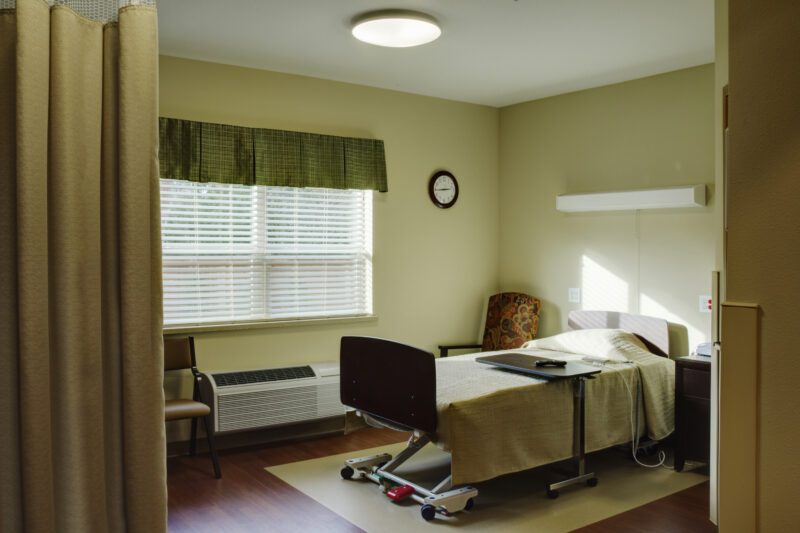Maine’s top advocate for residents in nursing homes and assisted living facilities expressed concern at The Maine Monitor and ProPublica’s recent finding that residents unsafely wandered away from Level IV residential care facilities at least 115 times from 2020 to 2022.
Brenda Gallant, Maine’s long-term care ombudsman, said while there is no requirement that her office be alerted about these incidents — called “elopements” — she sometimes hears of them from an assisted housing facility, family member or another concerned person, or when the Department of Health and Human Services cites a facility.
But The Monitor’s recent reporting surprised her.
“We were not aware of the number of elopements from assisted housing,” Gallant told The Monitor. “The numbers are indicative of a need for providers to take steps to develop a plan to assure the safety of residents as required by regulation.”
A recent investigation by The Maine Monitor and ProPublica found that residents of Maine’s Level IV residential care facilities (generally known as assisted living facilities) unsafely wandered away at least 115 times from 2020 to 2022.
In the vast majority of those cases, the state never inspected the facilities, conducting only a desk review or no investigation at all. Only two cases — one resulting in a death — led to sanctions.
Lindsay Hammes, a DHHS spokesperson, said investigators decide not to take action for a variety of reasons, including because a facility has moved to correct the underlying issue.
“The department takes seriously and investigates instances of elopement. A desk review is one type of investigation,” Hammes said.
Hammes also noted that the 115 cases of elopement found by The Monitor likely varied in severity, adding in a response this week that some may have been situations where residents “may not have returned at the expected time.”
In recent months, Gallant said DHHS’s division of licensing and certification, which provides regulatory oversight of the state’s medical and long-term care facilities, has been in touch with her office and medical providers to seek input on assisted housing regulations. She pointed to the upcoming rulemaking process as a chance to address questions of safety at assisted living facilities.
“In the months ahead, assisted housing regulations will go out to rule-making with an opportunity for public comment and a required review by the legislature. This will be critically important in strengthening protections for resident care,” Gallant said. “The needs of residents in assisted housing facilities have increased significantly over the years, making regulatory change a necessity.”
Hammes said DHHS expects the updated regulations will be ready for legislative review in January, and may include updated provisions related to elopement incidents and reporting requirements.
“Rule revisions are based on input from DHHS, residents, providers, partners and the public, and seek to address areas within the system in need of oversight to ensure the health and safety of residents in these settings,” Hammes said.
Gallant noted that regulations are only a minimum standard, and ultimately it is up to facilities to ensure the safety of their residents.
“If a resident living in assisted housing is in danger of elopement, the facility must identify this risk in the service plan and take steps to protect the well-being and safety of the resident,” Gallant said. “This may involve increased staffing, frequent checks and staff training to engage and redirect residents who wander. Residents who are at risk of elopement should be cared for in a secure environment.”
The Maine Monitor and ProPublica have previously reported that although the state considers residential care facilities to be “nonmedical institutions,” they are caring for an influx of older Mainers, many with significant medical needs, following the state’s decision in the mid-1990s to make it harder to qualify for nursing home placement.
Rep. Dan Shagoury, a Democrat representing Hallowell, Manchester and West Gardiner who serves on the health and human services committee, told The Monitor he too was “very surprised” by the number of elopements at Level IV facilities.
He said he would consider introducing legislation next session, if he is reelected in November, around the department’s limited investigation of these incidents, but first he wants more information from DHHS about why it doesn’t investigate every elopement it hears about.
“I would love nothing better than if, as a result of conversations and (the) article, the department says ‘maybe this is a problem’ and fixes its regulations,” Shagoury said. “I like it when the department self-polices, and they do that fairly often and pretty well — but not always.”
Rose Lundy can be reached at gro.r1753930907otino1753930907menia1753930907meht@1753930907esor1753930907.







